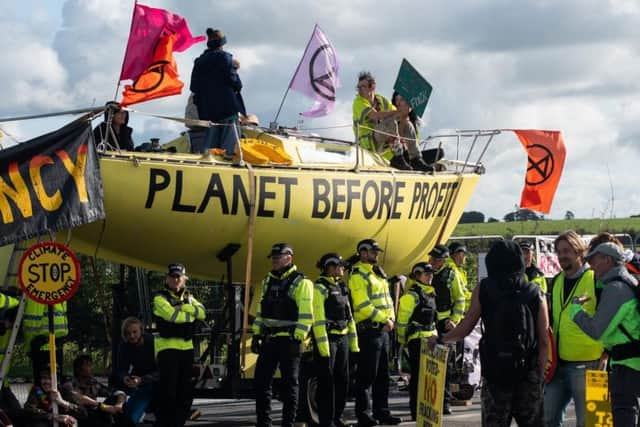Fracking has cost tax-payers more than £32m but progress is slower than expected, says watchdog
The National Audit Office estimates that at least £32.7m has been spent by public bodies since 2011 on dealing with policing, environmental monitoring and planning applications linked to hydraulic fracturing for shale gas.
Despite this, its report published today says progress in establishing a shale gas industry in England has been slower than expected, with only three wells fracked to date compared with the Government's target of 20 by the middle of the next decade.


Advertisement
Hide AdAdvertisement
Hide AdThe three wells fracked by energy giant Cuadrilla in Lancashire have seen activity halted or stopped altogether because of earthquakes, while rival operator Third Energy did not receive consent to frack its well at Kirby Misperton in North Yorkshire amid fierce local opposition.
According to the NAO's report, a public attitudes survey by the Government shows opposition to fracking has risen from 21 per cent of the population to 40 per cent between 2013 and 2019, with the proportion in support falling from 27 per cent to 12 per cent.
It said: "Public concern has centred on the risks to the environment and public health; from fracking-induced earthquakes; and the adequacy of the environmental regulations in place.
"Local authorities we interviewed said the strength of public opposition for shale gas planning applications was unprecedented. One local authority received around 36,000 responses to the public consultations for planning applications to frack shale gas wells."
Advertisement
Hide AdAdvertisement
Hide AdThe NAO said the Department for Department for Business, Energy and Industrial Strategy did not know the full cost of supporting shale gas development through fracking, where a mixture of water, sand and chemicals are injected at high pressure deep underground.
It said costs have been borne by government departments, regulators, local authorities and other local bodies, amounting to at least £32.7m since 2011 and including £13.4m spent by local police forces managing protests.
North Yorkshire Police spent £740,000 managing protests at Kirby Misperton, with the Home Office reimbursing £614,000, while Nottinghamshire Police spent £900,000 on protests at a proposed site at Misson, near the South Yorkshire border. Lancashire Police has only been reimbursed for £5.8m of the £11.8m costs it has incurred.
Other costs include £8.4m spent by the Department for Business, Energy & Industrial Strategy on supporting shale gas between 2012 and 2020, as well as £300,000 for each fracking planning application.
Advertisement
Hide AdAdvertisement
Hide AdThe report outlines how North Yorkshire County Council had more than 4,000 representations in its consultation on a shale gas application, compared with nearly 450 representations it received for what it considered a contentious application for a waste recovery park.
There is estimated to be 1,329 trillion cubic feet of shale gas in England, primarily in the North and Midlands, representing nearly half the UK’s annual demand for gas.
The Government says shale gas may help counteract the decline of domestic oil and gas production and reduce the UK’s reliance on oil and gas imports. But the NAO says the size of its contribution is unclear as Ministers don't know how much shale gas can be technically and commercially extracted.
Conservatives have raised fears that the party's support for fracking could cost it a number of marginal seats at the next General Election.
Advertisement
Hide AdAdvertisement
Hide AdAnd Professor Simon Sweeney from the University of York told the Tory conference last month that continued government support will lead to "overwhelming" public protests that will do "incredible damage" to Tory electoral hopes in marginal constituencies.
Rebecca Long Bailey MP, Labour’s Shadow Business and Energy Secretary, said: “The Tory-Lib Dem Coalition and now the Tory Government have wasted millions pushing an industry that is unpopular across the UK and fiercely opposed locally.
“Fracking threatens air and water quality, and it contributes to the climate crisis. And as this report reveals, the Government's plan for making fracking sites safe after they’ve been used is unclear and untested. Well let me be crystal clear - Labour will ban fracking immediately.”
A BEIS spokesperson said: “The Government has always said shale gas exploration can only proceed as long as it is safe and environmentally responsible.
“The Oil and Gas Authority will soon publish a finalised scientific assessment of recent industry data and we will set out our future approach as soon as we have considered the findings.”